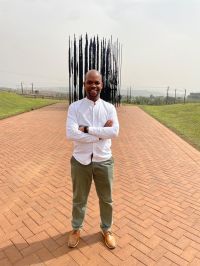I am honoured to address you for the first time as the new CEO of the Nelson Mandela Foundation. As I step into this role, I want to think about what the critical areas are, at this moment, into which we should invest our energy and focus.
The Kgalema Motlanthe Drakensberg Inclusive Growth Forum took place from 25 to 27 October 2024. Recommendations coming out of the forum for how to deal with the critical challenges facing South Africa ranged from lofty trade and foreign policy proposals to practical, nuts-and-bolts matters of how to make public administration work.
The discussions were characterised by a breathtaking frankness – about the need for the Government of National Unity or the grand coalition to get its priorities clear, about elites talking to one another at such forums and nothing changing afterwards, and about pacts between government and the private sector that bypass accountability to the public. It was made clear that economic growth is not going to solve our problems if the value being added goes to the top 1% or 10%, i.e. if it only serves to make the rich even richer.

Mbongiseni Buthelezi at the Howick, KwaZulu-Natal, site where Nelson Mandela was captured in 1962.
What also emerged strongly was a recognition that South Africa is in a crisis that we can no longer just keep talking about. The price to pay for all of society if nothing meaningful is done is too great. The riots of July 2021 were an early wake-up call. Much worse awaits because political entrepreneurs have figured out how to take advantage of the swirling anger of what Rekgotsofetse Chikane calls ‘the lost generation’ for their own ends.
It was encouraging to hear that the analysis of the crisis facing South Africa in such a forum is very similar to what one hears in civil society forums grappling with the same question. This means that even though state and private actors often seem to be talking to only one another and civil society actors are in their own separate conversations, we are all ending in the same place about what the wicked problems of our time are. There are only slight differences of emphasis.
When it comes to what is to be done about these problems, economic growth emerged as key in the Drakensberg dialogue. Critically, this economic growth must be inclusive and transformative. To get there, South Africa needs to be clear about one question – what is in the national interest – and align its foreign policy with its trade policy.
Domestically, we need to move away from talking about inequality only in terms of income. We have to deal with asset and wealth inequality. One way to do so is to renew our focus on land redistribution. Another is to sort out the mess that our education system is in and stop teaching people for a life of poverty and marginalisation.
I participated in the forum at a time when, as an organisation, we are seized with the question of how best we can use the inheritance that Nelson Mandela left to us to contribute most meaningfully to moving South Africa and the world towards a just future. It is becoming clear to me that we need to revisit the question of leadership and lean into Madiba the activist and Madiba the statesman. In this moment when, in the words of W.B. Yeats writing in 1920 after the devastation of World War I, ‘the best lack all conviction, while [t]he worst are full of passionate intensity.’ We need leadership for a future in which people adapt to the accelerating climate crisis and to significant technological change. We must trouble ourselves and ask, what if the leaders we have in civil society, state institutions, government and business are only equipped for a world that is passing or is already past?
At the Foundation we will grapple with this troubling question as we work out how Madiba’s legacy as a leader can help contribute to this changing world. This is certainly a new phase for the Foundation and as we continue this work, we hope we can rely on your continued engagement and support.